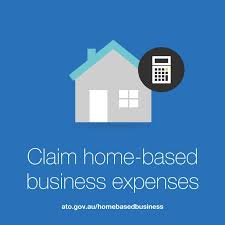Important change to claiming home office expenses

Do you want to claim the home office expenses you are entitled to claim for 2022/23? Then read on as the ATO has made an important to change claiming home office expenses.
Furthermore, they apply from 1st March.
We have been able to claim under one of two methods:-
- A percentage of all costs based off the work area or
- A set rate per hour
The set rate per hour had been 52 cents per hour but an alternative rate of 80 cents per hour was offered from March 2020 to June 2022 to accommodate all of those working from home for the first time and who were not used to keeping records. The 80 cph rate was an all in rate. Only the 52cph rate allowed one to claim phone, internet and assets (whether claimed in full or depreciated). As I said, that 80cph rate is no longer available.
Please note that this post is not addressing claims where a business is run from home (with important capital gains tax implications). That will be covered in a future post.
A new rate is available from 1st July 2022 but please note:-
- The rate has increased from 52 to 67 cents.
- What the rate covers has changed.
- There have been important changes to the records required.
- But there is good news. The requirement to have an area set aside to undertake work activities has been removed.
What does the rate cover?
- Electricity and gas
- Home and mobile phone usage
- Internet connection usage
- Printing and stationery
The change is that other than electricity and gas, these costs could be claimed separately.
Depreciation is to be claimed separately
What records you now need to keep
- Receipts – but just one quarterly electricity or gas bill (I don’t know about you but I receive these bills monthly).
- A record of actual hours worked – no estimates. So you will need to keep timesheets, rosters, diaries and other such documents.
- You will need to keep these records for up to 5 years – even though most taxpayers are required to keep for less.
- Please note that for assets that are depreciated, one must keep the asset purchase receipt for 5 years from after the last depreciation claim. That could be 10 or 15 years after the date of purchase. We suggest moving a copy of the receipt into next year’s tax records when starting your record keeping for a new financial year.
A partial year concession
These new rules announced last week apply from 1st July 2022.
As a concession to those who haven’t kept a record of actual hours worked since 30th June 2022 to 28th February 2023, a reasonable estimate, or in the ATO’s words, a representative record, will suffice.
To be able to claim, you must keep an actual record of hours worked from 1st March 2023.
How to keep records
- Paper
- Electronic – including the ATO’s myDeductions tool (which you can access at https://www.ato.gov.au/General/Online-services/ATO-app/myDeductions/)
This is an important change which you need to adhere to claim home office expenses from 1st March 2023.
We welcome any questions you may have.
Upcoming interest rate rises

It seems all the pundits are now predicting not only a rate rise next Tuesday of 0.25% but another 3 such rises during the year. For many newish homeowners, this means the base rate of 4.1% is well above the 2.5% interest stress test under which they gained their loan.
So what does this mean to your personally and/or your business?
One number I have heard is that there are 110,000 households in Melbourne suffering mortgage stress. And that is no surprise when you consider that the repayments on a $750,000 loan have already increased by $1,300 per month. And if they increase by another 1%, then those repayments will increase by a further $480 per month. It s scary to contemplate what that current number of 110,000 will grow to.
You can find out more and be given actions you can implement in our webinar tonight at 5:30. We will also explore 4 other key areas to plan and protect against in 2023.
You can book your place at https://tinyurl.com/bdvxtvmn
5 key actions in 2023

There are always challenges but we seem to currently have our fair share. We currently see 5 key actions required to navigate 2023.
The question is what are you going to do about them? Are you going to let them control you? Or are you going to protect yourself from them to ensure your business or yourself personally doesn’t suffer?
We see 5 risk areas to navigate in 2023:-
- Cyber crime & computer safety.
- Inflation.
- Interest rates (and cash flow).
- Technology.
- Protect personal wealth that is otherwise exposed.
The degree to which these 5 risks affect you may be different to others and may be one or two don’t affect you. But doing nothing is rarely the best option. We therefore encourage you to attend our upcoming webinar on Tuesday 31st January at 5:30 during which we explore these risks – and more importantly, the 5 keys actions you can implement in face of them.
You can reserve your place by clicking here.
And as we are passionate about helping small businesses, we welcome your extending this invitation to family, friends and business colleagues.

SG deadline reminder

I trust you had an enjoyable festive season – and back into it we go! So here is a quick SG deadline reminder.
Friday 27th January is the end date for satisfying your Super Guarantee (SG) super obligations for the December 2022 quarter.
Please make sure you do not confuse this obligation with the December quarter BAS. The December quarter BAS automatically has a one month extension to 28th February to all. There are no extensions for reporting and payment of SG super.
Please note that super clearing houses take up to 8 days to pass the money through to the super fund. It therefore means that processing and payment to the clearing should be made as soon as possible.
And please make sure you have been calculating super at 10.5% since it increased on 1st July 2022.
SG super should never be paid late as late payments attract substantial interest and penalties. Furthermore, SG (and BAS) liabilities that remain unreported and unpaid after 3 months automatically become personal debts of directors.
We also take this opportunity to remind you of the imminent migration to Single Touch Payroll 2 with its extra reporting requirements. Please do not hesitate if you would like an introduction to a payroll specialist.
We welcome any questions you might have.
How to avoid making Christmas too taxing

Entertaining and providing gifts at Christmas time to staff, customers and suppliers is a cost of doing business. However, there are some important FBT, GST and income tax considerations and outcomes to keep in mind.
As an employer, you need to be careful at what you provide at Christmas. The rules are complex and the costs of getting it wrong can prove very expensive.
We will outline some of the more common scenarios and what to be careful of.
Under-pinning the implications are the following key points:-
- Christmas parties, entertainment and gifts are all treated under entertainment tax rules.
- FBT applies to benefits given to employees.
- There are no FBT implications on entertainment and gifts given to customers, clients and suppliers.
- There are three methods under which an employer can quantify the taxable components of any entertainment expenditure – in fact there are 38 permutations depending on who is entertained where, how and with whom. We will largely address the actual method which is the one used by most small businesses (as it usually results in the best outcome). It is beyond the scope of this briefing to address the 12 week log method and we will only touch upon the 50/50 method where relevant.
- Christmas comes but once a year and to the best of my knowledge and experience does so on 25th December. Nevertheless, the ATO treats Christmas parties and gifts as being what are called minor, infrequent and irregular benefits.
- Such minor benefits are FBT exempt where they cost less than $300 (including GST) provided the actual method is used to quantify entertainment.
The Christmas party
Where entertainment is calculated under the actual expenditure method (which is the most common method for small businesses):-
- A Christmas party is held on-site on a work day, the whole cost for each employee will be an exempt fringe benefit. So too will the spouse’s cost provided the cost per spouse is less than $300. No income tax deduction can be claimed for the cost of the party including that in respect of any family members that may attend. Taxi travel to or from the workplace (not both ways) will be exempt from FBT and not tax deductible.
- If a Christmas party is held off the work premises, then the whole cost will be exempt from FBT provided the party costs less than $300 per person (employees and their spouses). No income tax deduction can be claimed for the cost of the party including that in respect of any family members that may attend.
- If an external Christmas party costs more than $300 or more per person then the total cost is subject to FBT.
- The cost of any entertainment provided during the party (whether that be at the work premises or outside) will be exempt if it costs less than $300 per head – for example a DJ, musician, clown and comedian.
- The cost of entertaining clients, customers and suppliers is not subject to FBT and is not tax deductible.
- If any exemption is exceeded then FBT is payable. Consequently, an FBT Tax Return must be lodged and FBT paid (the FBT tax rate being the same as the top marginal tax rate). Please keep this in mind when completing the 2018/19 FBT Questionnaire in early April 2019.
- All other entertainment during the year will be subject to FBT on a case by case basis.
Where entertainment is calculated under the 50/50 method:-
- 50% of the cost will be subject to FBT and this portion will be tax deductible. The other 50% will not be subject to FBT and will not be tax deductible. An FBT Tax Return must be lodged and FBT paid.
- Only taxi travel from home to the venue will be FBT exempt and not deductible for tax.
- 50% of all other entertainment during the year will be subject to FBT.
Gifts
The following gifts are exempt from FBT and are tax deductible:-
- Hampers, bottles of wine, gift vouchers, a pen set costing less than $300 (inclusive of GST).
The following gifts are subject to FBT and are not tax deductible:-
- Tickets to a sporting event or theatre, holiday, accommodation, etc.
The GST treatment of gifts is:-
- The GST component of any tax deductible portion can be claimed back.
- The GST component that relates to the non tax deductible portion can’t be claimed.
Please do not hesitate to call us should you have any queries.
Important Director Identification Number (DIN) update

This has no doubt been caused by their phone systems being in meltdown. But finally we have some logical relief in having to apply for a Director Identification Number (DIN).
A DIN is required for all directors including those of trustee companies and trustees of self managed super funds.
A director is issued with a unique number irrespective of how many directorships are held.
Thankfully we finally have some common sense relief.
Those that were a director before November 2022 need not apply for a DIN if:-
- The sole or all companies of which one is a director are liquidated before 1st
- The sole or all companies of which one is a director are deregistered before 1st
- A deceased director (you would think this exemption would have bene in place for the start particularly given one of the stated aims of this system is to eliminate phoenix activity).
- Directors who have ceased due to losing capacity.
- Director who resign all directorships before 1st December. Please note though that it appears there is a carve out for this for those who try and re-appoint themselves after 30th November.
If you haven’t applied as yet for your DIN, please do so immediately.
The fine for not doing so is $13,200 and it will be recorded as a criminal offence. It remains to be seen what relief may be given – but don’t rely on that.
Need to no more? Then either call us or check this earlier blog (and related articles).
How you can make sure that your super doesn’t go to the wrong people

How you can make sure that your super doesn’t go to the wrong people? It’s a question anyone with super should ask themselves. Even if your balance is low, a life insurance payment can create a whole new scenario. Peoples biggest 2 assets are almost always their family home and their super. Your Will dictates who is to get our home if it is owned entirely in your own name. If it is owned jointly with your partner, then they will get your half should you pre-decease them; in other words it doesn’t form part of your estate. Your super though is held in trust for you. If your super is with a public fund (industry, retail, employer and so on) then it is up to their board trustees to decide who is to receive your super in the absence of a complying death benefit nomination. The trick is to have the right form of nomination in place. When it comes to self managed super funds, it can become of whole lot trickier. Not only do you need the right form of death benefit nomination in place, but you must be wary of the trust deed. As they are generic in nature, they don’t reflect your wants or desires. Moreover, they can confer general powers which are open to be used in inappropriate ways depending on how the cards fall. In an upcoming 30 minute webinar we will explore:-
The webinar will be held from 5:30pm on Wednesday 30th November. You can register by clicking on the following link – https://us02web.zoom.us/webinar/register/WN_Ov2inp73QdG955M_Bhk9Jg And as we are passionate about helping people to become more successful and secure, we welcome your extending this invitation to family, friends and business colleagues. |
Does your firm comply with Privacy Laws?

Does your firm comply with Privacy Laws? The recent Optus and Medibank privacy hacks have been alarming. They are also a clarion call to assess how your firm collects, holds and protects data.
And clearly what will happen next is that both laws and expectations will tighten. And tighten they will as our privacy and security requirements lag major countries and in particular Europe.
So what must you do?
Firms with group turnover in excess of $3,000,000 must comply and adhere to the 13 principles as set out the Privacy Act.
You can read more about those principles here
But those that handle Tax File Numbers (like tax agents) or medical records must adhere to these principles no matter what their turnover is. Credit reporting firms are also automatically covered by the Privacy Act.
So what does this mean you need to do
Not by all means a complete list, some of the key activities you should undertake are:-
- Consider what data you actually need.
- Consider how your team should best ask and collect personal data.
- Consider what data you hold is sensitive.
- Consider how long you should keep that data.
- Consider how you are going to keep that data – such for how long, is it going to be encrypted, who has access to it.
- Consider where you store data.
- Undertake regular cyber training.
- Adequately train team members on all requirements.
- Review regularly!
- And take out cyber protection insurance – we say this last as prevention is better than cure.
Please ask us if you would like a referral to a suitably qualified technical expert or cyber insurer.
Urgent ASIC DIN requirement

This is an urgent reminder to those directors who have yet to apply for their ASIC Directors Identification Number (DIN).
You now only have 3 weeks left in which to apply and receive your DIN.
Not obtaining one by the due date is a criminal offence and subject to a fine of $13,320.
It is also a civil offence which attracts a fine of $1,100,000.
We have progressively been publicising this obligation in our newsletters and remind you of our blogs which you can read at:-
19th October 2021 – click here re what is a DIN and your obligations.
8th February 2022 – click here for update on DIN requirements.
3rd April 2022 – click here for DIN obligations for first time directors.
At this stage it now appears too late to request a paper form and have it processed in time.
Online is the best way of applying. You can do so by clicking here.
However, if you have differences in your name as registered with different government authorities, it is best to ring 13 62 50 (and do so in the morning).
Please call us if you have any question – but above all else don’t leave this any longer – apply today!
$2,000 grant to help you take control


A new state government grants recognises that whilst many small businesses have survived covid lockdowns they still have lingering needs and require further assistance to ensure:-
- Profitability
- Sufficient cash flow
- Have greater insight over their business
- Better plan for the future (and do so in light of new business norms and changing customer behaviour).
To enable and encourage this, a Specialist Advice Pathways Program grant of $2,000 will be paid to enable the receipt of qualified professional support.
So what are the qualifying criteria to receive the grant?
- Be a company, trust (with a corporate trustee), partnership or individual.
- Have held an ABN at 1st July 2020.
- Being registered as an employer with Worksafe Victoria – that is have a WorkCover policy.
- Have between 1 and 19 full time equivalent employees (presumably at the time of application).
Sole traders and partnerships that don’t employ anyone are not eligible nor are trusts where an individual or individuals are trustees.
Isn’t this great – your business might qualify to receive $2,000 of funding for one or more of these fundamentally key activities:-
- Advice and analysis regarding the management of cash flow, preparation or cash flow budgets and projections
- Profitability analysis and formulation of financial management and/or operational business strategies
- Strategic analysis to revise business planning and/or governance arrangements
- Advice regarding the management of debts and liabilities
- Advice and/or representation regarding commercial agreement contract terms (i.e. commercial leases or commercial supply contracts).
So who can provide these services?
We can (except the last which is legal)! A service provider needs to be a registered:-
- Accountant / tax agent
- Book-keeper
- Lawyer
As such, business coaches are excluded.
So how do you apply for the grant?
Unlike past government grants, we, as the qualified service provider, can’t apply on your behalf.
One must apply by 30th September – but like with past grants, applications will close earlier if the allocated funds are exhausted before then.
Applications will be assessed with a confirming approval email to be sent by the end of October.
It is important that we be involved with this process as:-
- It requires the ABN Registry to be correct for which we will need to check and possibly update (noting that with the ABN system being introduced in 2000, the registry appeared somewhere in the late 2000’s and many not have been updated)
- As the Qualified Service Provider, we need to prepare a service agreement. That agreement either needs to be attached to the application or its key contents set out in the application.
You will need to upload at least one identifying document. You will also need to include my professional membership details.
Other matters of note
- The services must be delivered by the end of January 2023.
- You will need to complete a statutory declaration as to the services provided.
- Payment is made in 2 lots – $1,000 within 20 days of acknowledging the successful application email and within 20 days of completing the final claim form.
- You will also be requested to complete a short survey.
- You will also be required to attest that all industrial relations obligations are being met – which include having evidence of having supplied all employers with the 11 national employment standards.
So what will be the cost of the services I require?
Well that will depend on:-
- How many of the first 4 stated services you require and
- The complexity of your business and
- The quality of your financial information.
We are building a matrix to determine the investment into attending to any of the qualifying services and provide you with the required service agreement.
Where do I register?
https://businessvic.secure.force.com/GrantsPortalLogin
Next steps
Alex Stewart is contacting existing clients to discuss their situation and how they will benefit from this grant. Unlike past state grants, Sam Della Bosca can’t apply on your behalf but she will guide applicants through the process.
By way of closing comment, please don’t let this opportunity slip by. Every small business should undertake these qualifying activities. And now that the troubling days of 2020 and 2021 are behind us, this gives you the chance to undertake proper planning for the future.
